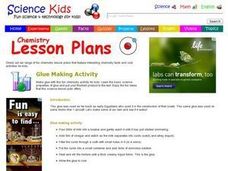Museum of Science
Balloon Racers
Watch those balloon cars go! Scholars build racers that run using the power of balloons and conduct races with the cars. They learn about Newton's third law of motion and how it applies to their balloon racers.
Curated OER
Ice Earrings Activity
Students put a piece of string between 2 ice cubes and fuse them together with pressure. In this ice lesson plan, students see how the cubes stick together.
Curated OER
Glue Making
Students make glue out of milk and vinegar. In this chemistry lesson plan, students combine curds of milk with an ammonia solution until a creamy liquid forms.
Curated OER
Springtime Party Favors
Students plant a flower in a keepsake pot. In this art lesson students each plant a seed in a small pot. The students take their pot with the planted seed home.
Curated OER
Old Telephone Books: A Recycling Journey
Students read about old telephone books are being recycled to make new objects and then answer short answer questions about it. In this recycling lesson plan, students also look into their books to find information.
Curated OER
Fun Robot Activities
Students complete a variety of activities that have to do with robots. In this robot lesson plan, students pretend to do tasks blindfolded, look up a chat bot online, list TV shows based on robots, and more.
Curated OER
Planet Facts
Students click on the links to planets to learn facts about them. In this planets lesson plan, students read about 8 of the planets in the Solar System.
Museum of Science
Gravity Sewer
It's all downhill from here. Scholars model a sewer system using straws and other household materials. They test out their systems using colored water and discover how gravity plays an essential role in sewers.
Museum of Science
City Circuit
Here's an electric lesson on electricity. Pupils create an electric circuit to model a city's electric system. They then test out different materials to see whether they are conductors of electricity.
Museum of Science
Sound Design
Hear about a great resource on sound? An interesting hands-on activity has learners construct a device that will soundproof a phone or speaker. They test out different materials to see which ones best absorb sound waves.
Curated OER
How Gear Systems Work: A Research Project
Students apply information regarding simple machines along with the math concept "ratios." The teacher introduces the concept that technology is the application of scientific knowledge and mathematics concepts to solve a problem. This is...
DiscoverE
Paper Tower
Read all about it! Challenge your class to build taller and stronger. Newspapers provide the means to build towers in a simple activity. Scholars try to build as tall a tower as possible with just two sheets of newspaper.
Agriculture in the Classroom
Pumpkins... Not Just For Halloween
Celebrate fall with four pumpkin themed hands-on activities! After learning about pumpkins, scholars complete two activity sheets that reinforce estimation and word problems. They then plant pumpkin seeds and bake a pie in a bag.
DiscoverE
Squishy Circuits
Make electricity flow through Play-Doh. Individuals create animals or other creatures using Play-Doh. The engineering aspect? Eyes that light up and Play-Doh that conducts electricity.
DiscoverE
Creepy Putty
Mold your learners into materials engineers. Using glue, Borax, and water, scholars create a viscoelastic material. But your class might know it by another name—Silly Putty.
DiscoverE
Paper Recycling
Paper is made from paper, right? Future scientists take bits of paper and produce sheets of recycled paper. The only drawback? It has to dry overnight.
DiscoverE
Slime!!
Who's going to get slimed? Your entire class! Scholars create slime using Borax, water, and white glue. Some food coloring can give the slime a bit of color.
National Park Service
The Young Naturalist
Beginning with a brief history of our 26th president, Theodore Roosevelt, then followed by a discussion of his interest in nature, young scientists take to the outdoors to locate and observe local plants and insects. Scholars return to...
PBS
Season Seeking
It's a time of change. A hands-on activity engages young scientists in a lesson highlighting the change of seasons. They brainstorm indicators of season changes in nature and then look for them. Next, they record observations in a field...
PBS
Twirling in the Breeze
Blow classes away with a hands-on lesson investigating wind speed. Learners use common materials to design and construct anemometers. They then test their anemometers and collect data on the wind speed created by a fan.
DiscoverE
Hoop Glider
Fly into an engineering lesson sure to get your scholars' interest off the ground. Young pupils create hoop gliders out of straws and paper hoops. Adjusting the size and number of the hoops lets them investigate the effect on flight...
Perkins School for the Blind
Friction
Friction is a force that can be felt, which means that learners with visual impairments can experiment to feel and understand the concept of friction. They slide a rock along a smooth table, and then they slide a rock across sandpaper,...
Curated OER
Chesapeake Bay Watershed Project
Students conduct a simulation to determine the health of local streams and rivers. They role-play as researchers, scientists, politicians, and writers and use technology to implement plans to improve the quality of waterbodies.
Other popular searches
- Earth Science
- Physical Science
- Life Science
- Science Project
- Science Space
- Environment Science
- History of Science
- Environmental Science
- Pe Science
- Family and Consumer Science
- Consumer Science
- Social Science
























